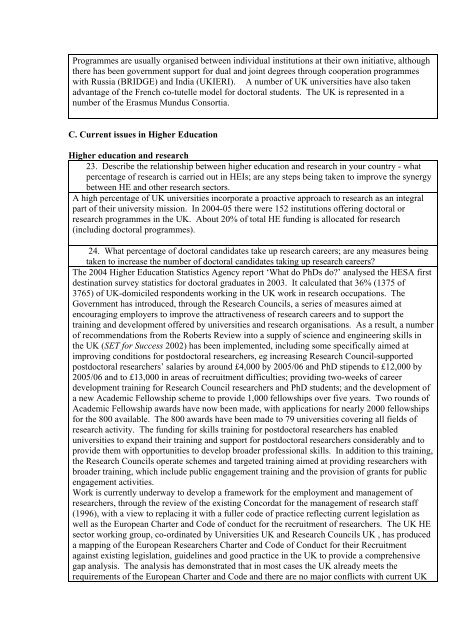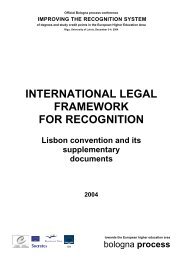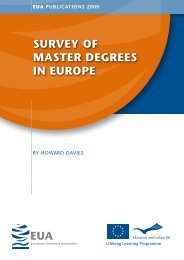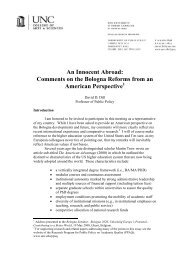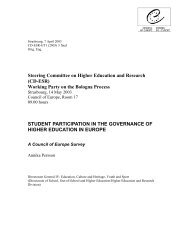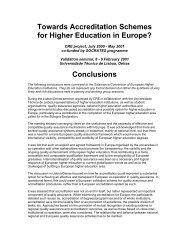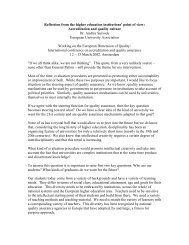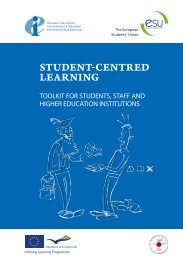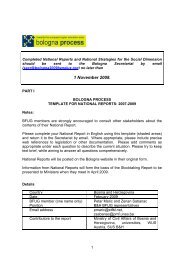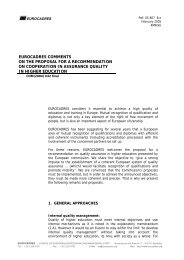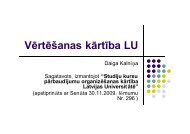BOLOGNA PROCESS - UK England, Wales & Northern Ireland
BOLOGNA PROCESS - UK England, Wales & Northern Ireland
BOLOGNA PROCESS - UK England, Wales & Northern Ireland
Create successful ePaper yourself
Turn your PDF publications into a flip-book with our unique Google optimized e-Paper software.
Programmes are usually organised between individual institutions at their own initiative, althoughthere has been government support for dual and joint degrees through cooperation programmeswith Russia (BRIDGE) and India (<strong>UK</strong>IERI). A number of <strong>UK</strong> universities have also takenadvantage of the French co-tutelle model for doctoral students. The <strong>UK</strong> is represented in anumber of the Erasmus Mundus Consortia.C. Current issues in Higher EducationHigher education and research23. Describe the relationship between higher education and research in your country - whatpercentage of research is carried out in HEIs; are any steps being taken to improve the synergybetween HE and other research sectors.A high percentage of <strong>UK</strong> universities incorporate a proactive approach to research as an integralpart of their university mission. In 2004-05 there were 152 institutions offering doctoral orresearch programmes in the <strong>UK</strong>. About 20% of total HE funding is allocated for research(including doctoral programmes).24. What percentage of doctoral candidates take up research careers; are any measures beingtaken to increase the number of doctoral candidates taking up research careers?The 2004 Higher Education Statistics Agency report ‘What do PhDs do?’ analysed the HESA firstdestination survey statistics for doctoral graduates in 2003. It calculated that 36% (1375 of3765) of <strong>UK</strong>-domiciled respondents working in the <strong>UK</strong> work in research occupations. TheGovernment has introduced, through the Research Councils, a series of measures aimed atencouraging employers to improve the attractiveness of research careers and to support thetraining and development offered by universities and research organisations. As a result, a numberof recommendations from the Roberts Review into a supply of science and engineering skills inthe <strong>UK</strong> (SET for Success 2002) has been implemented, including some specifically aimed atimproving conditions for postdoctoral researchers, eg increasing Research Council-supportedpostdoctoral researchers’ salaries by around £4,000 by 2005/06 and PhD stipends to £12,000 by2005/06 and to £13,000 in areas of recruitment difficulties; providing two-weeks of careerdevelopment training for Research Council researchers and PhD students; and the development ofa new Academic Fellowship scheme to provide 1,000 fellowships over five years. Two rounds ofAcademic Fellowship awards have now been made, with applications for nearly 2000 fellowshipsfor the 800 available. The 800 awards have been made to 79 universities covering all fields ofresearch activity. The funding for skills training for postdoctoral researchers has enableduniversities to expand their training and support for postdoctoral researchers considerably and toprovide them with opportunities to develop broader professional skills. In addition to this training,the Research Councils operate schemes and targeted training aimed at providing researchers withbroader training, which include public engagement training and the provision of grants for publicengagement activities.Work is currently underway to develop a framework for the employment and management ofresearchers, through the review of the existing Concordat for the management of research staff(1996), with a view to replacing it with a fuller code of practice reflecting current legislation aswell as the European Charter and Code of conduct for the recruitment of researchers. The <strong>UK</strong> HEsector working group, co-ordinated by Universities <strong>UK</strong> and Research Councils <strong>UK</strong> , has produceda mapping of the European Researchers Charter and Code of Conduct for their Recruitmentagainst existing legislation, guidelines and good practice in the <strong>UK</strong> to provide a comprehensivegap analysis. The analysis has demonstrated that in most cases the <strong>UK</strong> already meets therequirements of the European Charter and Code and there are no major conflicts with current <strong>UK</strong>


